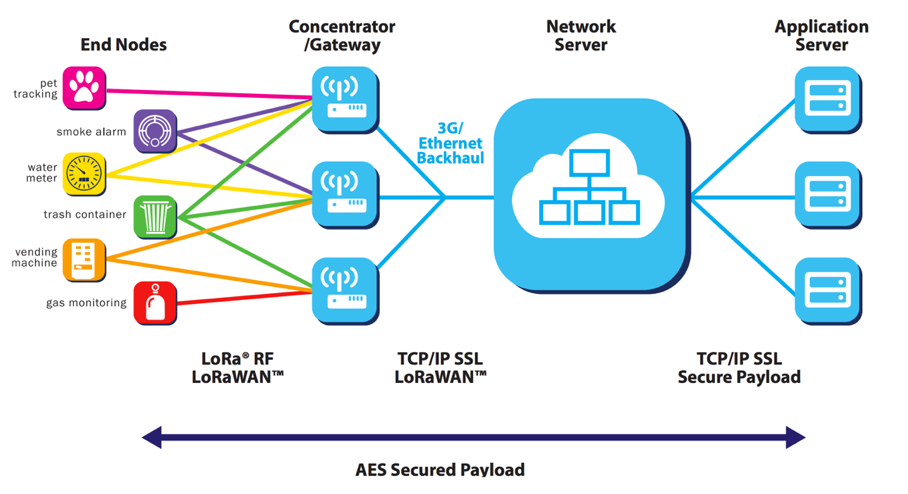Signal and Modulation Types
Signal Type
LoRa Protocol Stack
Image courtesy of ResearchGate.net
LoRa is an Internet of Things (IoT) technology that transmits digital signals as Bytes. LoRaWAN can reliably send data payload messages with a maximum of 100 Bytes every 7 seconds. The medium through which the signals are transmitted is wireless free space.
LoRa is a communication networking solution that enables low energy transmission of data over long distances.
LoRa Coverage Range
| Urban Areas | 2 km - 3 km (1.2 mi - 1.9 mi) |
|---|---|
| Rural Areas | 5 km - 7 km (3.1 mi - 4.3 mi) |
| World Record | 702.7 km (436.6 mi) |
LoRa signals operate in unlicensed Ultra-High Frequency (UHF) spectra distributed into several Industrial, Scientific, and Medical (ISM) radio frequency bands. LoRaWAN end-devices utilize three different sub-band channels including bandwidths of 125 kHz, 250 kHz, and 500 kHz. The chosen ISM band and sub-band channel depends on the localized region and will affect the overall Data Rate (DR).
Example LoRa Frequency Bands
| Europe (EU 868 MHz Band) | 863 MHz - 870 MHz |
|---|---|
| Europe (EU LPD433) | 433.075 MHz - 434.775 MHz |
| United States (US 915 MHz Band) | 902 MHz - 928 MHz |
| Australia (AU 915 MHz Band) | 915 MHz - 928 MHz |
| China (CN 779 MHz Band) | 779 MHz - 787 MHz |
| China (CN 470 MHz Band) | 470 MHz - 510 MHz |
Modulation Type
Chirp Spread Spectrum LoRa Modulation
Image courtesy of ubidots.com
LoRaWAN is most commonly implemented upon LoRa modulation. However, it may instead be implemented upon either the Frequency Shift Keying (FSK) or Gaussian FSK (GFSK) modulation techniques. LoRa utilizes a method known as Chirp Spread Spectrum (CSS), which encodes the input data signal with sinusoidal pulses or chirps. LoRa modulation is optimal for channel noise immunity, multipath fading, Doppler effect, and low power transmission.
LoRa Modulation Specifications for a 125 kHz Sub-band
| Spreading Factor | Chirps per Symbol | SNR Limit | Time-on-Air for a 10 Byte Packet | Data Rate |
|---|---|---|---|---|
| 7 | 128 | -7.5 | 56 ms | 5.341 Kbps |
| 8 | 256 | -10.0 | 103 ms | 3.052 Kbps |
| 9 | 512 | -12.5 | 205 ms | 1.717 Kbps |
| 10 | 1024 | -15.0 | 371 ms | 977 bps |
| 11 | 2048 | -17.5 | 741 ms | 537 bps |
| 12 | 4096 | -20.0 | 1.483 s | 293 bps |
LoRaWAN Topology
Image courtesy of Medium




